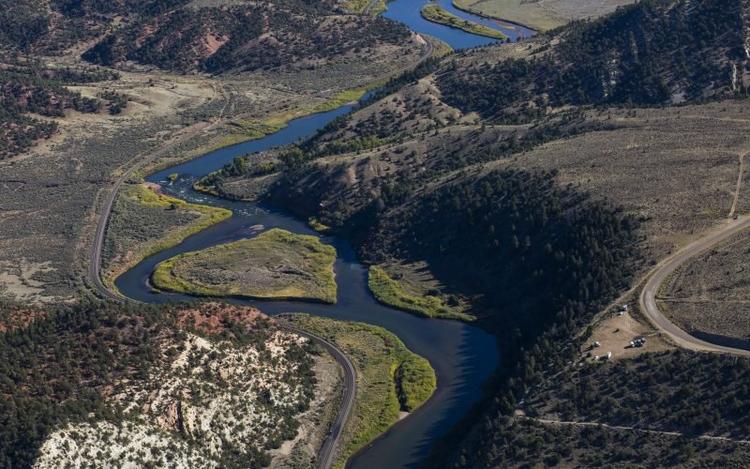By Luke Runyon /KUNC |
( Cronkite News) – GREELEY, Colo. – A warming climate already is reducing stream flows in the Southwest’s largest watershed, according to a new study from scientists with the U.S. Geological Survey. And as the planet continues to heat up, it said, the shortages are likely to get worse.
Using hydrologic models, researchers found that the Colorado River Basin is extremely sensitive to slight variations in temperature. In their new paper in the journal Science, they show that for each degree average Celsius temperatures rise, flows in the Colorado are likely to decline more than 9%.
That decline is likely to cause severe water shortages in the basin, where more water exists on paper in the form of water rights than in the river itself. Higher temperatures reduce snowfall and diminish snowpack, lessening the amount of water available.
Snow on the western side of the Rocky Mountains, where the Colorado River and its main tributaries get their starts, is brilliantly white, reflecting a large amount of solar radiation. With
“As snowpack declines, the basin is absorbing more radiation,” said Chris Milly, a USGS hydrologist and the study’s co-author. “That radiation is energizing the evaporation, it’s cranking it up and leaving less water behind to fill the river and supply the 40 million users downstream.”
Colorado, Utah, Wyoming, New Mexico, Arizona, California and Nevada depend on the Colorado for drinking and irrigation water.
The flow reductions might sound insignificant, Milly said, but they will be felt throughout the 250,000-square-mile basin.
“There’s not a lot of slack in the system,” he said. “In the long-term communities, states will be making adjustments to how they allocate water.”
The new study builds on an existing body of scientific work that shows how the Colorado River will respond to warming.
Some climate models are mixed on whether climate change will cause more or less precipitation in the basin. But Milly said it would take a significant increase to offset the declines caused by warming.
“This is an eyepopping result,” said Brad Udall, a climate researcher at Colorado State University whose previous work showed the river basin likely to see severe declines in flows because of rising temperatures.
The finding comes as water managers throughout the vast watershed are gearing up for negotiations over a long-term plan for the Colorado’s management. The river’s current operating guidelines expire at the end of 2026, and the states that make up the watershed are required to start negotiating new ones by the end of this year.
“The new rules must consider how to manage the river with unprecedented low flows in the 21st century,” Udall said. “The science is crystal clear – we must reduce greenhouse gas emissions immediately. We now have the technologies, the policies and favorable economics to accomplish greenhouse gas reductions. What we lack is the will.”
This story is part of a project covering the Colorado River, produced by KUNC and supported through a Walton Family Foundation grant. KUNC is solely responsible for its editorial content.
This story is part of Elemental: Covering Sustainability, a multimedia collaboration between Cronkite News, Arizona PBS, KJZZ, KPCC, Rocky Mountain PBS and PBS SoCal.
This story is part of Elemental: Covering Sustainability, a multimedia collaboration between Cronkite News, Arizona PBS, KJZZ, KPCC, Rocky Mountain PBS and PBS SoCal.
Via Cronkite News
Featured Photo for KUNC by Nick Cote.



 © 2026 All Rights Reserved
© 2026 All Rights Reserved